Guest post by Erin Haendel, camp parent, middle school teacher, and summer resource staffer.
Imagine a circle of friends enjoying their free time. During the school year, I can picture a group of twelve and thirteen year olds, huddled around a phone, looking at the group text, checking recent Instagram posts. Those outside that social group hover on the sidelines or gather with their own friends doing something similar. As a middle school teacher, I see this social situation play out everyday. As soon as school lets up, young people huddle up with the friends to check the latest news on their devices. And then it’s off to their daily scheduled activities – sports, music, dance, etc. before finishing up with homework or more time tethered to technology.
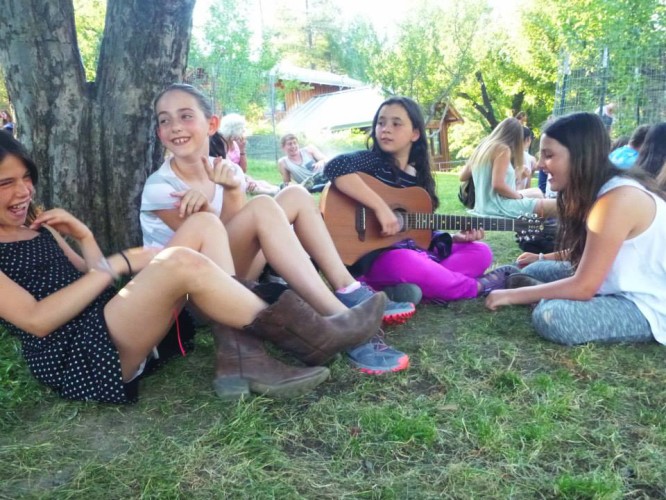 Now imagine a different circle of friends. Young people gathered around on the grass under the apple trees. Nine year olds mingle with fourteen year olds in mixed gender groups. The kids into sports and the kids into art sit together strumming guitars and playing cards. They may be resting up after a long hike up Gates Mountain, or feeling proud of having just baked twenty loaves of warm honey bread for the all-ranch dinner. Perhaps they just got done herding the cows back up to the pasture, or accomplished the high V on the ropes course. They’re unplugged because there’s no choice – there’s no connection. Kids who don’t cross paths in the city, or even at the same school, creating life-long bonds in the outdoors.
Now imagine a different circle of friends. Young people gathered around on the grass under the apple trees. Nine year olds mingle with fourteen year olds in mixed gender groups. The kids into sports and the kids into art sit together strumming guitars and playing cards. They may be resting up after a long hike up Gates Mountain, or feeling proud of having just baked twenty loaves of warm honey bread for the all-ranch dinner. Perhaps they just got done herding the cows back up to the pasture, or accomplished the high V on the ropes course. They’re unplugged because there’s no choice – there’s no connection. Kids who don’t cross paths in the city, or even at the same school, creating life-long bonds in the outdoors.
Every year I am fortunate to see the positive growth and benefits that young people get out of attending summer sleep-away camp. During the school year I am a middle school teacher. During the summer I get the chance to work as an adult resource staff at the oldest accredited co-ed sleepaway camp in California – Bar 717 Ranch. I work at a wonderful, amazing, project-based school. We get out of the classroom more than any school I know of. But still, it’s life in the city. Students tend to stick with their own social groups, and after school many hurry off to a life of scheduled activities and time online. There’s little time for face to face connection and leisurely conversation in the outdoors.
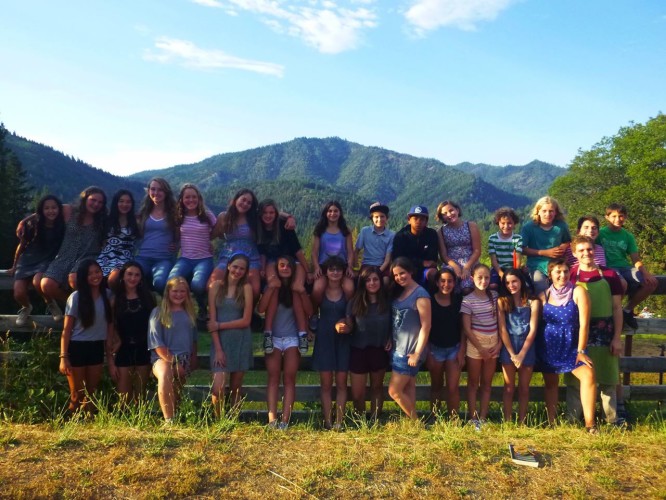
For the past few years, almost thirty students from my school have spent time as campers at Bar 717 Ranch. From knowing them and working with them both before and after camp and from hearing from them and their parents, I see firsthand the positive benefits of camp as an educator. I see how camp gives children the skills and confidence to make new friends across age and social groups, live and thrive without technology, practice leadership, gain the courage to jump into new experiences, and work as a group to accomplish goals.
At schools students most often spend the day with other children their own age. At camp, these same young people mix easily with older and younger kids. A horseback trail ride might include eight year old girls and fifteen year old boys. I’ve seen ninth graders and third grades skin and cook rattlesnake together. Sitting in the craft shop or woodshop for hours, multi-age groups bond over creating and building together. On Saturday night, ten year olds and fourteen year olds partner up for the Virginia Reel.
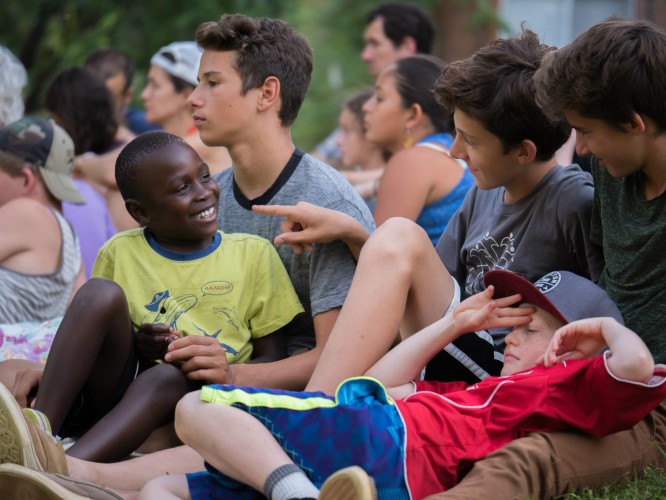 Older teenage campers learn how to mentor and take care of younger campers. Younger campers learn from the kindness and experience of their elders. Veterans teach first year campers little things like how to make lanyards and friendship bracelets, and bigger things like how to be part of a camp family. I’ve seen students who wouldn’t dare sit outside their social group on the school lunch benches enjoy long leisurely meals on the eating platform in a multi-age and multi-gender setting.
Older teenage campers learn how to mentor and take care of younger campers. Younger campers learn from the kindness and experience of their elders. Veterans teach first year campers little things like how to make lanyards and friendship bracelets, and bigger things like how to be part of a camp family. I’ve seen students who wouldn’t dare sit outside their social group on the school lunch benches enjoy long leisurely meals on the eating platform in a multi-age and multi-gender setting.
Another reason that young people are able to make friends across age and social groups, is that camp gives kids the chance to unplug and thus connect with nature and each other. I know students at school who almost panic when their phone is taken away. A phone not allowed on a field trip? What will I do to pass the time on the bus? How will I find my parent in carpool line? What if I miss the group text? The latest Instagram post? The funny photos on Snapchat?
I see my students almost sigh with relief when they get off the bus at camp and get a break from technology and social media. They don’t have to wonder what people are saying about them. They don’t have to think about what posts they missed. And what they really realize is they just don’t miss it at all! My students tell me time and time again, they can’t believe they don’t even think about their devices. They realize it’s more fun to just be present with friends, face-to-face, experiencing nature and each other.
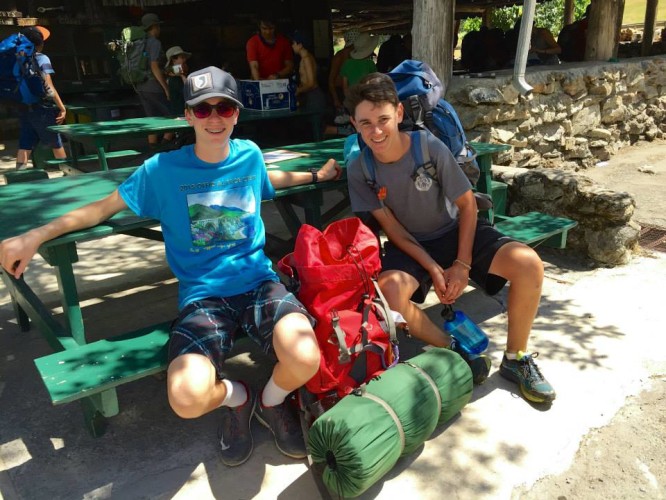 While they are off of their devices, camp also allows young people to try new things and realize the benefits of taking risks. I’ve seen the self-admitted “urban” kids, kids who say they hate dirt and dislike bugs, go on, and thrive on overnights in the woods. I’ve seen them do things they didn’t think they could – hike five miles up Gates Mountain with a full backpack, cook dinner over an open fire, jump off the rock into the river at Below Mays, and sleep out under the stars at Diamondback. What they may have worried about and even dreaded the day before, they realize – I can do it! I can do something that’s different, that’s challenging, that’s out of my comfort zone.
While they are off of their devices, camp also allows young people to try new things and realize the benefits of taking risks. I’ve seen the self-admitted “urban” kids, kids who say they hate dirt and dislike bugs, go on, and thrive on overnights in the woods. I’ve seen them do things they didn’t think they could – hike five miles up Gates Mountain with a full backpack, cook dinner over an open fire, jump off the rock into the river at Below Mays, and sleep out under the stars at Diamondback. What they may have worried about and even dreaded the day before, they realize – I can do it! I can do something that’s different, that’s challenging, that’s out of my comfort zone.
These risks also allow leadership skills and collaborative group work skills to flourish. I’ve seen teenagers set up and cook for a group of hundreds at the community BBQ. They take pride in their work and take responsibility for being in charge. These young people learn that they can plan, organize, and make things happen. They can carry out a project from start to finish. I’ve seen others load and unload hay for the Bar 717 horses and collect and carry down the food scraps to feed dinner to the pigs. They take pride in their ability to provide for the animals and in seeing that their leadership and contributions make a real difference to the ranch community.
And then they come back from camp. And back to school. Back to daily life of sports, music, gymnastics and other activities. Back to their old social groups and back to Instagram, Snapchat, and whatever the latest app is. Even though they return to the same place and the same things, with each year at camp, each camp experience, they come back with a little bit of camp in them.
As a teacher, I see it in the little things. Kids who’ve been to camp come back with leadership skills. They realize if I can cook for hundreds of people, I CAN lead this Social Studies project. If I can climb Gates Mountain and learn to milk a cow, I CAN learn something challenging. If I can comfort a first time camper, I CAN be a mentor and an upstander on campus. If I can play cards and make friendship bracelets with a teenager, I CAN make friends out of my age/social group. If I can live and THRIVE for two weeks, four weeks, six weeks, without my smart phone, perhaps I don’t need to text and go on social media everyday.
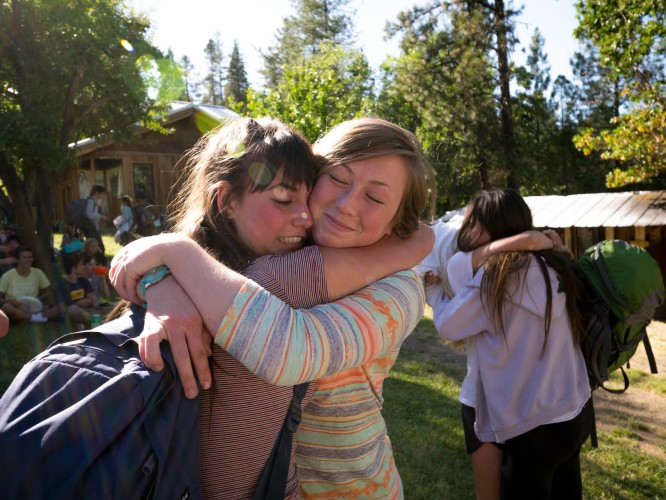 And I see in the way the connect with each other. The special way they relate to others near and far who also went to Bar 717. We have this bond. We shared something special. Something away from real life. Nature, community, friendship. Camper Sarah Fahn (14) writes, “If you think about it, camp is kinda like a Breakfast Club situation. So many different people from so many different places come together to create the strongest friendships in the entire universe. These friendships that I have made over the past four years are so, so special to me, and nothing could ever compare. So many unique and amazing people all come together to create one big happy family, among the most magical place on Earth.”
And I see in the way the connect with each other. The special way they relate to others near and far who also went to Bar 717. We have this bond. We shared something special. Something away from real life. Nature, community, friendship. Camper Sarah Fahn (14) writes, “If you think about it, camp is kinda like a Breakfast Club situation. So many different people from so many different places come together to create the strongest friendships in the entire universe. These friendships that I have made over the past four years are so, so special to me, and nothing could ever compare. So many unique and amazing people all come together to create one big happy family, among the most magical place on Earth.”
The lessons from camp will continue to translate to school and to life. Learning about sharing – about, “offer to the left and pass to the right.” Learning about group work – getting organized in two lines for “I Love a Rainy Night.” Learning about the power of nature, being unplugged and in the moment – listening to the wind blow through the valley during Vespers at Inspiration Point. And learning about building relationships and keeping them. “Brothers now our meeting is over, brothers we must part, and if I shall see you never more, I’ll see you in my heart.”

